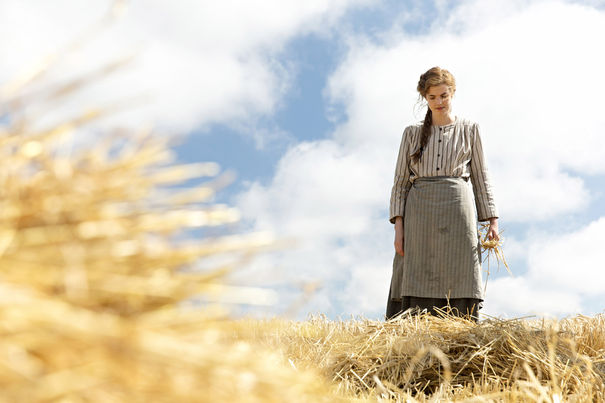Terence Davies and his search for a soft touch
by Cesar Castanha

Sunset Song
In Terence Davies’ film The Deep Blue Sea (2011), the image of Rachel Weisz lying on the floor awaiting death sets the stage for a series of observations about Great Britain and the interactions among family and close friends that, in a certain sense, form the history of a nation and its people. The private story of a woman who does not love her husband, but rather another man, is placed within the context of World War II. Personal and societal issues must come to terms with one another to move beyond a certain individual and collective melancholy.
Sunset Song, the director’s next film (showing in Festival do Rio’s Panorama series) seems to try to make the same point. Adapted from the Scottish novel Lewis Grassic Gibbon, the film is set in the Scottish countryside, and tells the story of Chris Guthrie (Agyness Deyn), daughter of a peasant who inherits land form her cruel father (Peter Mullan). She goes through a period of freedom from patriarchy prior to her wedding, in the run-up to WWI, and before her husband (Kevin Guthrie) is forever changed by the conflict with Germany. It is also a story, as the off-screen narration constantly reminds us, about the land and how it will survive us all.
This film, however, does not quite manage to approach the topic and characters as subtly as the previous film. In fact, the effort, in scene after scene, to achieve a soft touch leads to an exaggerated seriousness, perhaps the heavy stylistic hand of the director. The acting and the realistic tone of the film are the results of a failed attempt at subtlety.
The off-screen narration, which may indeed be the worst part of the film, also shows the unsuccessful attempt at connecting with the novel, which is a pity. If we can compare The Deep Blue Sea with This Happy Breed (1944) by David Lean, it is clear in Sunset Song that Davies doesn’t come close to Lean’s ability to create a dialogue between film and literature, as Lean did sublimely in Oliver Twist (1948) and Great Expectations (1946).

